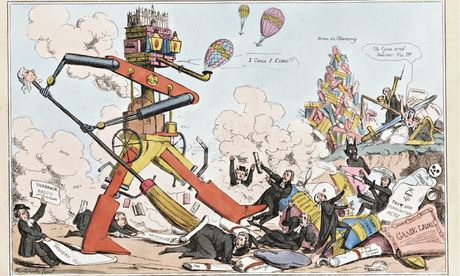 |
| The March Of Intellect, portrayed in a cartoon of 1828 as a giant steam-driven robot sweeping away the established order, was changing everything for better, or for worse. |
1828 – here in the U.S. we are now the Age of Jackson, partially thanks to “the Press”; when we, over here, think in terms of the Age of Jackson, the final destruction of the Federalist party, universal franchise (for white men), Indian Removal, Jackson' economic ignorance bringing on one of the longest and worst financial disasters in our history, the inflating bubble of the domestic slave trade and the growth of secessionist "philosophy". Yet, all these other ideas and discussions were going on in the minds of men and women too, as much in the adolescent U.S. as in the far more mature England.
This makes me shiver – as quoted from the review, again, the advances in printing made these ideas more available to more people. It was as much in effect here in the U.S. in the era of raging populism (playing a huge role in the election of Andre Jackson to the Presidency),
as it was for a highly educated, developed, brilliant intellects as George Eliot (then Mary Ann Evans) and her to-be common law partner, George Henry Lewes, and her intellectual sparring partner to-be, Herbert Spencer. All of them were enthralled by Lyell’s thinking.
.... What may now look like "the dawn of the Victorian age", as James Secord's subtitle has it, was to contemporaries an era all of its own in which The March of Intellect, portrayed in a cartoon of 1828 as a giant steam-driven robot sweeping away the established order, was changing everything for better, or for worse.
The new steam-powered printing presses brought cheap reading matter to ever larger audiences and among the books available to buy or borrow were the founding texts of subjects from psychology to physics. ....
.... If one question preoccupied the thinking classes of the 1830s more than another it was time. Newton had long since opened up space, but time remained trapped in biblical chronology, which reckoned the Earth to be about 6,000 years old. It was increasingly clear that this was not enough to account even for human history, but evidence for an alternative theory was slow in coming.
It emerged from one of the newer sciences when the first part of Charles Lyell's Principles of Geology was published in 1831. Lyell's theories about the formation of the earth broke the time barrier and his book, Darwin found, "altered the tone of one's mind". Many minds were altered in due course, but as Secord makes clear the process was gradual and the alterations various. For some people it meant the end of God. The atheist Charles Southwell sent for Lyell's Principles when he was in prison for blasphemy. Yet many contemporaries read it as a way of reconciling the material evidence of the fossil record with the slow unfolding of a divine plan.
The mysteries of time, even documented, historical era parallels, are still here, to be investigated and marveled at, part of the history of ideas.






No comments:
Post a Comment